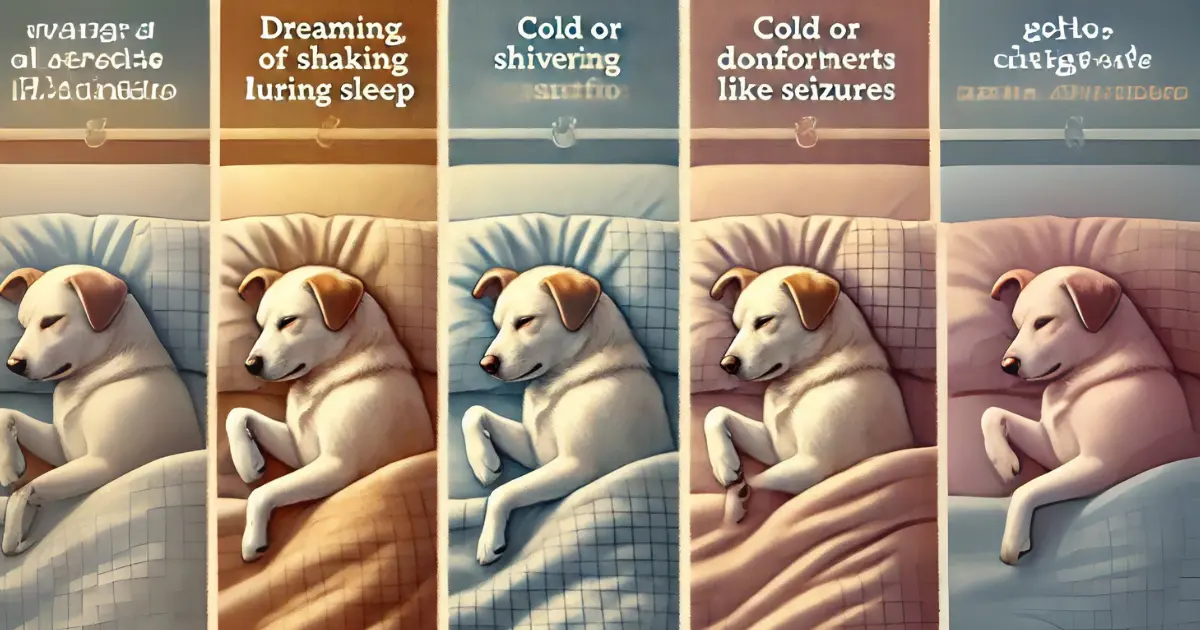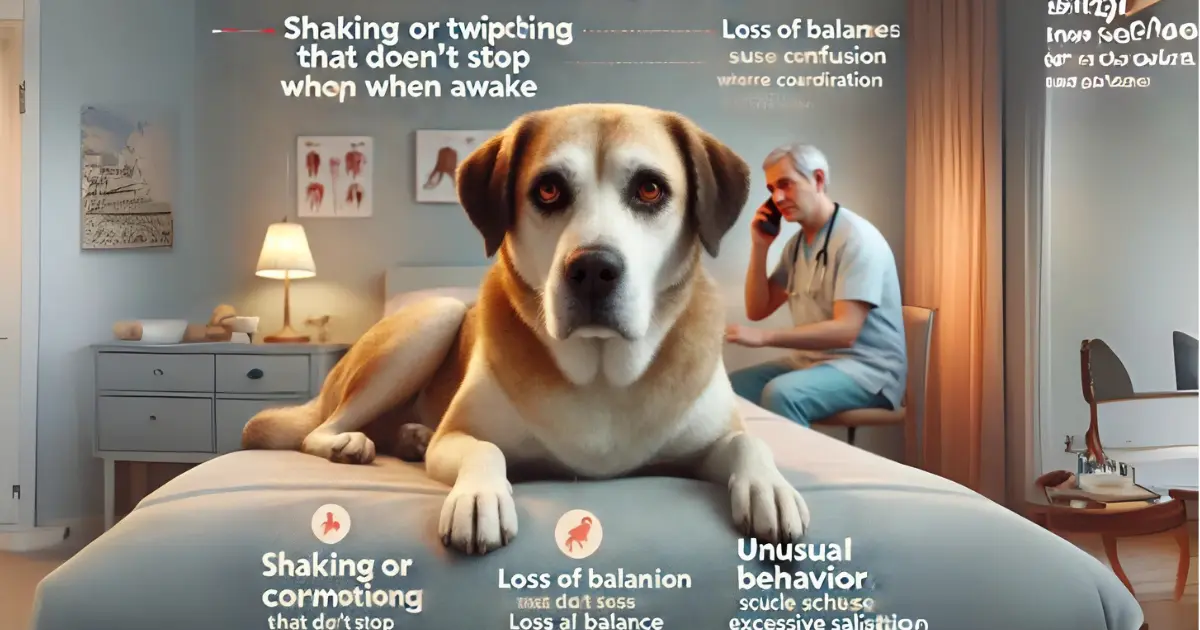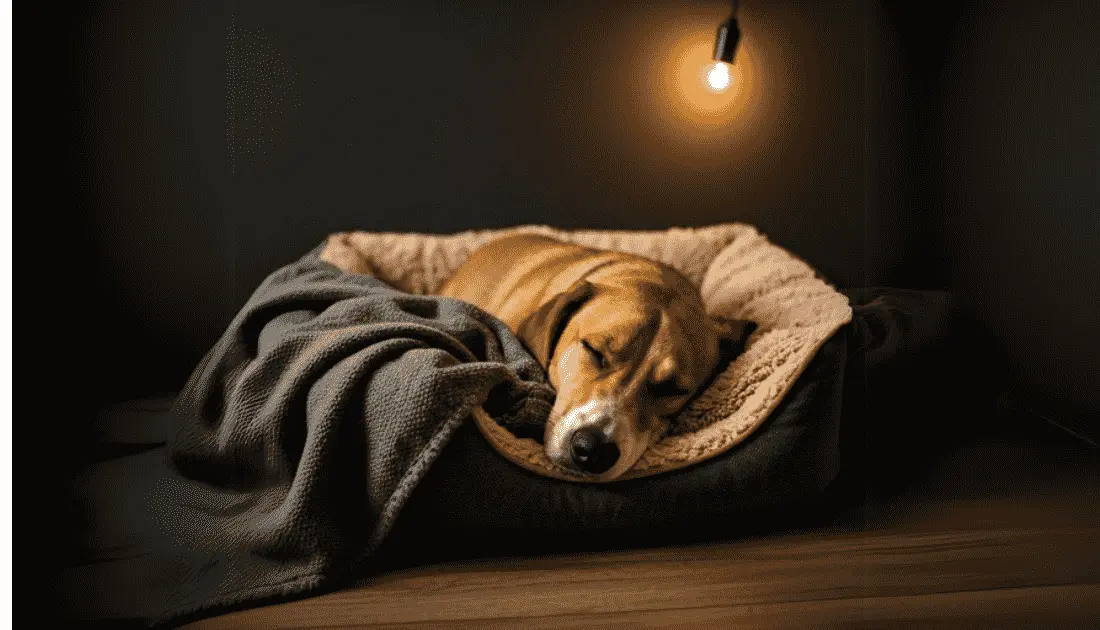Why Dogs Shake in Sleep: Causes and How to Help
Published: 28 Dec 2024
Have you ever noticed your dog shaking or twitching while they sleep? It can be a little puzzling, especially when they seem to be dreaming or even “running” in their sleep. But don’t worry—it’s usually completely normal! Learn more about why dogs need so much sleep. Let’s explain why dogs shake in sleep tremors and what you should look for.

Table of Contents
What Are Dog Sleep Tremors?
When your dog’s dreams shake, they are likely in REM (Rapid Eye Movement) sleep, the sleep phase where dreams happen. During this time, your dog’s brain is active, and their body might react with muscle twitches, shaking, or even little leg movements as if they’re running or chasing something.
Dogs experience different sleep cycles, just like humans, and REM is the most active stage. This is when dogs process emotions, memories, and experiences. You might notice them shaking, their eyes fluttering, or their paws twitching as if they’re moving in their dreams.

Common Causes of Shaking During Sleep
There are a few reasons why dogs shake while they sleep. Let’s look at the most common ones.
1. Dreaming
Dogs experience dreams just like humans do. The shaking you see may be their body reacting to the actions or emotions in their dream. Dogs may experience minor muscle spasms or tremors during REM sleep, such as when people move or twitch when they dream. This is a natural, harmless response.
For example, if your dog spends the day chasing a ball or playing with other dogs, its body may react to those activities in its sleep. You might notice it twitching its paws, which is its way of “running” in its dreams.
2. Cold or Discomfort
Sometimes, shaking during sleep can happen if your dog is too cold or uncomfortable. Dogs have a variety of ways to keep warm, and a slight drop in temperature can cause them to shiver. If you notice your dog shaking only when lying on a hard surface or in more extraordinary rooms, providing them with a warm bed or blanket might help.
For instance, a dog sleeping on a cold tile floor might shiver a little, even while asleep, because it’s not as insulated as when it’s in a warm, soft bed. Add extra bedding or a blanket for warmth if your dog seems too cold while sleeping.
3. Excitement or Anxiety
Just like people, dogs can dream about things that make them excited, scared, or nervous. If your dog had an active day or an emotionally intense experience, their dreams might reflect that. For example, a dog that had a stressful trip to the vet might shake during sleep as it processes the experience of its dreams.
Dogs also experience anxiety or stress that might affect their sleep patterns. If your dog’s shaking happens during stressful times, like before a trip to the vet or after a loud noise, it could be a sign of residual stress showing up in their dreams.
4. Seizures or Health Issues
While most dogs shake during sleep is normal, knowing when to be concerned is essential. If your dog is shaking or twitching during waking hours, it could be a sign of a medical issue, such as a seizure in dogs or a neurological condition. Seizures can sometimes cause uncontrollable shaking, and they’re usually more intense and last longer than typical sleep tremors.

When Should You Be Concerned?
In most cases, shaking during sleep is harmless. However, there are times when you should check with your vet. If your dog shakes during the day, or their tremors are frequent and accompanied by other symptoms (like excessive drooling, confusion, or weakness), it’s time to talk to your vet.
Here are a few signs to watch out for:
- Shaking or twitching that doesn’t stop when your dog wakes up.
- Loss of balance or coordination.
- Unusual behavior during or after the shaking (e.g., confusion, excessive salivation).
What Can You Do?
1. Provide a Comfortable Sleeping Environment
Ensure your dog’s sleeping area is comfortable, warm, and quiet. A cozy bed or blanket can help prevent shivering due to the cold. If your dog sleeps in a drafty area, consider moving its bed to a warmer spot.

2. Monitor Their Behavior
Keep an eye on your dog’s behavior. If it is shaking only while asleep and shows no signs of distress during the day, it’s likely part of its usual sleep cycle. However, if it is accompanied by other signs of illness, be sure to consult a vet.
3.Reduce Stress Before Bedtime
Try to reduce any stress your dog might experience before bedtime. If your dog is anxious, consider a calming routine before bed, such as a gentle walk, a quiet cuddle, or a soothing sound. This can help your dog relax and enjoy a peaceful night’s sleep.
Conclusion
Seeing your dog’s dreams shake can be fascinating, and in most cases, it’s just a regular part of their sleep cycle. Dogs dream like humans, and their bodies react with small movements or shakes. While it’s usually harmless, constantly monitor your dog’s overall health and behavior. If you’re unsure or concerned, don’t hesitate to contact your vet.
FAQ
1. Can shaking during sleep indicate how active my dog was during the day?
Yes, a highly active day with running or playing can lead to more intense dreams, which may cause increased shaking. It’s your dog’s way of “reliving” their activities during REM sleep.
2. Do older dogs shake more in their sleep than younger dogs?
Not necessarily, but older dogs may experience more sleep disruptions due to joint pain or health issues. If shaking seems excessive, it’s a good idea to consult a vet to rule out discomfort.
3. Is it possible for dogs to dream about their owners?
Yes, dogs often dream about their daily experiences, including interactions with their owners. If your dog is twitching or wagging its tail, it might be dreaming of playing or spending time with you.
4. Why does my dog sometimes vocalize or bark while shaking in sleep?
Dogs may vocalize, bark, or whine while dreaming if the dream involves excitement, stress, or communication. These sounds are normal and usually nothing to worry about unless accompanied by signs of distress.
5. Can shaking during sleep be a sign of low blood sugar in dogs?
Yes, in rare cases, shaking could indicate hypoglycemia (low blood sugar), especially in small or toy breeds. If your dog appears lethargic or weak during waking hours, consult a vet.
6. How can I tell the difference between normal sleep tremors and a seizure?
Sleep tremors are typically short and stop when the dog wakes up, while seizures are more intense, prolonged, and may involve drooling, stiffness, or confusion afterward. If unsure, record the behavior and consult your vet.
7. Do certain dog breeds dream more vividly than others?
There’s no evidence that specific breeds dream more vividly, but working or highly active breeds may have more complex dreams. This is due to their daily experiences involving activities like herding, running, or training.
8. Should I change my dog’s sleeping area if they shake frequently?
If the shaking is due to cold or discomfort, moving their bed to a warmer, quieter spot or adding extra padding can help. However, if shaking persists despite a cozy environment, consult a vet to rule out health issues.

- Be Respectful
- Stay Relevant
- Stay Positive
- True Feedback
- Encourage Discussion
- Avoid Spamming
- No Fake News
- Don't Copy-Paste
- No Personal Attacks



- Be Respectful
- Stay Relevant
- Stay Positive
- True Feedback
- Encourage Discussion
- Avoid Spamming
- No Fake News
- Don't Copy-Paste
- No Personal Attacks





